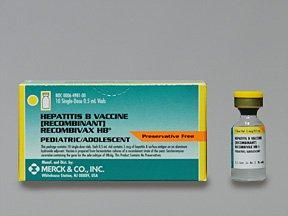Hepatitis B vaccine – for newborns and everyone else

- posted: May 25, 2018
What is Hepatitis B?
Hepatitis B infection is a viral infection of the liver. It can lead to jaundice, abdominal pain, liver failure, cirrhosis, and liver cancer. Hepatitis B is extremely contagious and can be transmitted through intimate contact, by sharing IV drug use materials and any other method in which bodily fluids may mix, including sharing a tooth brush or a razor with someone who is infected or by becoming exposed to the blood or sores of an infected person. Hepatitis B is many times more contagious than HIV in this respect, although not nearly as deadly. Pregnant women can also pass the virus to their newborns. Testing for Hepatitis B infection is done via a blood test.
Does Hepatitis B go away?
Many people who get infected with viral hepatitis (usually either Hepatitis A, B, or C, although there are other types as well) get mild symptoms or no symptoms at all and never realize they are sick; for most adults the viral infection goes away and they completely recover. Hepatitis B and C have more potential to remain active and cause chronic infection, but this occurs in a minority of adults. However, a larger number of children who get Hepatitis B develop chronic disease, and 9 out of 10 newborns who get hepatitis B during childbirth remain chronically infected for life unless the infection is prevented in the newborn nursery – see below. Those who develop chronic Hepatitis B infection must be monitored for signs of liver failure and liver cancer for life.
The Hepatitis B vaccine
In 1981 the first vaccine to prevent Hepatitis B was licensed in the U.S. It is given by injection and it is indicated for anyone at risk of contracting Hepatitis B, which is basically everyone. Almost all newborns receive Hep B vaccine at birth, and if a pregnant woman is known to have Hep B infection, her newborn should receive both the vaccine and a dose of Hepatitis B Immune Globulin (HBIG). When a newborn receives both HBIG and the full series of Hep B vaccines on time, the chances of preventing chronic infection are excellent. The Hepatitis B vaccine was the first vaccine to be able to prevent cancer (now HPV vaccine also prevents cancer as well, but of the cervix).
What is the timing for Hepatitis B vaccination?
For infants and young children, Hep B vaccine is given in 3 doses: dose 1 (ideally on the day of birth), followed by dose #2 given 1-2 months later, and dose #3 given 6 months after dose 1. For those who did not receive the Hep B vaccine series at birth, the same 0/1-2/6 month schedule is used for most older children and adults, but there is also a 2-dose schedule for older teens and adults and a different dosage for some people with chronic disease such as kidney failure. In the U.S. today Hep B vaccine use for newborns is almost universal, but in other countries it is used much less consistently or not at all.
You can learn more about Hepatitis B infection and the Hepatitis B vaccine at the CDC’s Hep B website here.
USUAL PEDIATRIC SCHEDULE:
- 1st dose at birth (prior to hospital discharge)
- 2nd dose at 1-2 months old
- 3rd dose at 6 months old
- **Many babies get 4 doses total in the first 6 months due to combination vaccines (less shots AND full protection)
Our Location
Hours of Operation
9:00 am - 5:00 pm
9:00 am - 5:00 pm
9:00 am - 5:00 pm
9:00 am - 5:00 pm
9:00 am - 5:00 pm
Closed
Closed